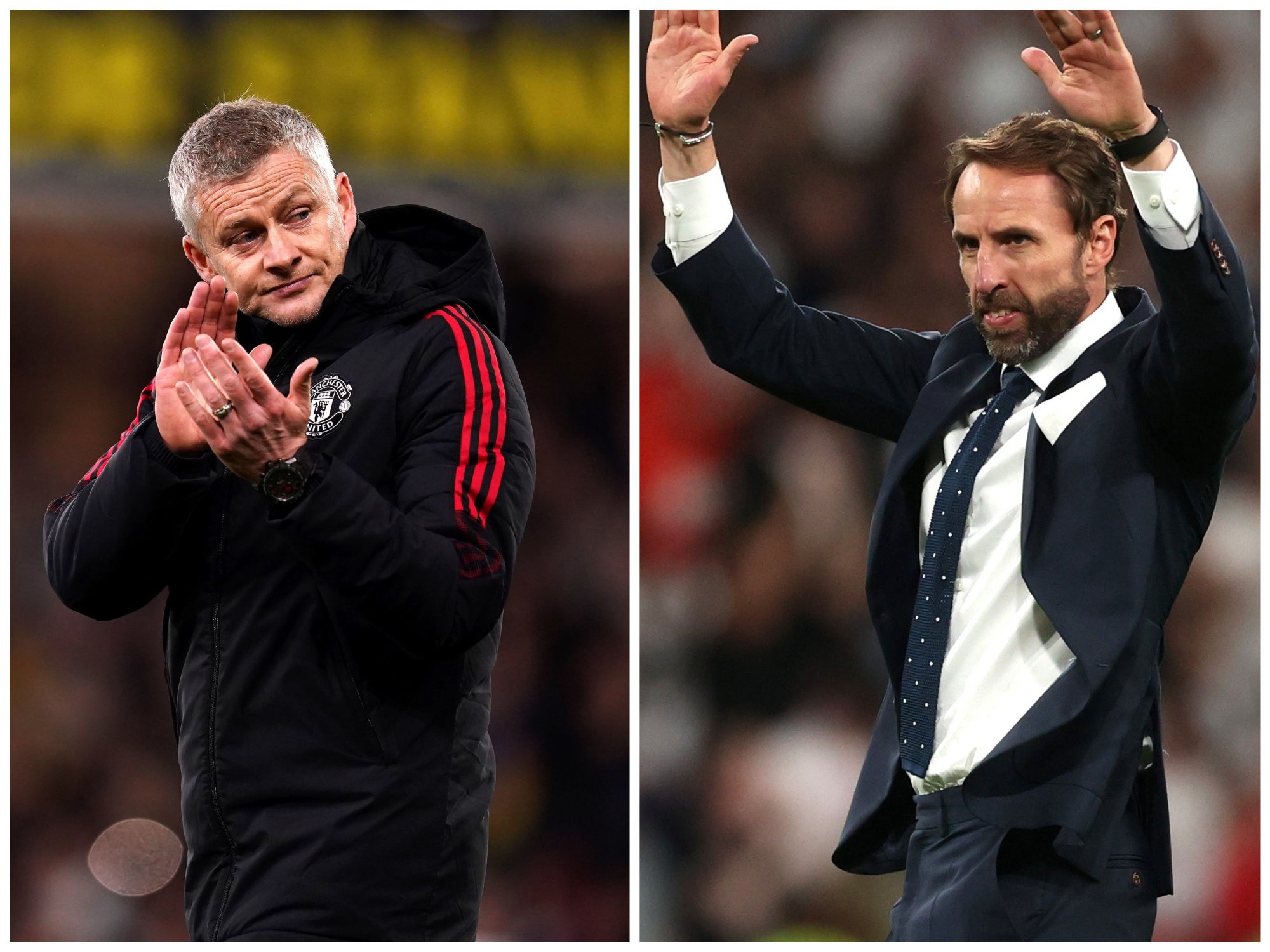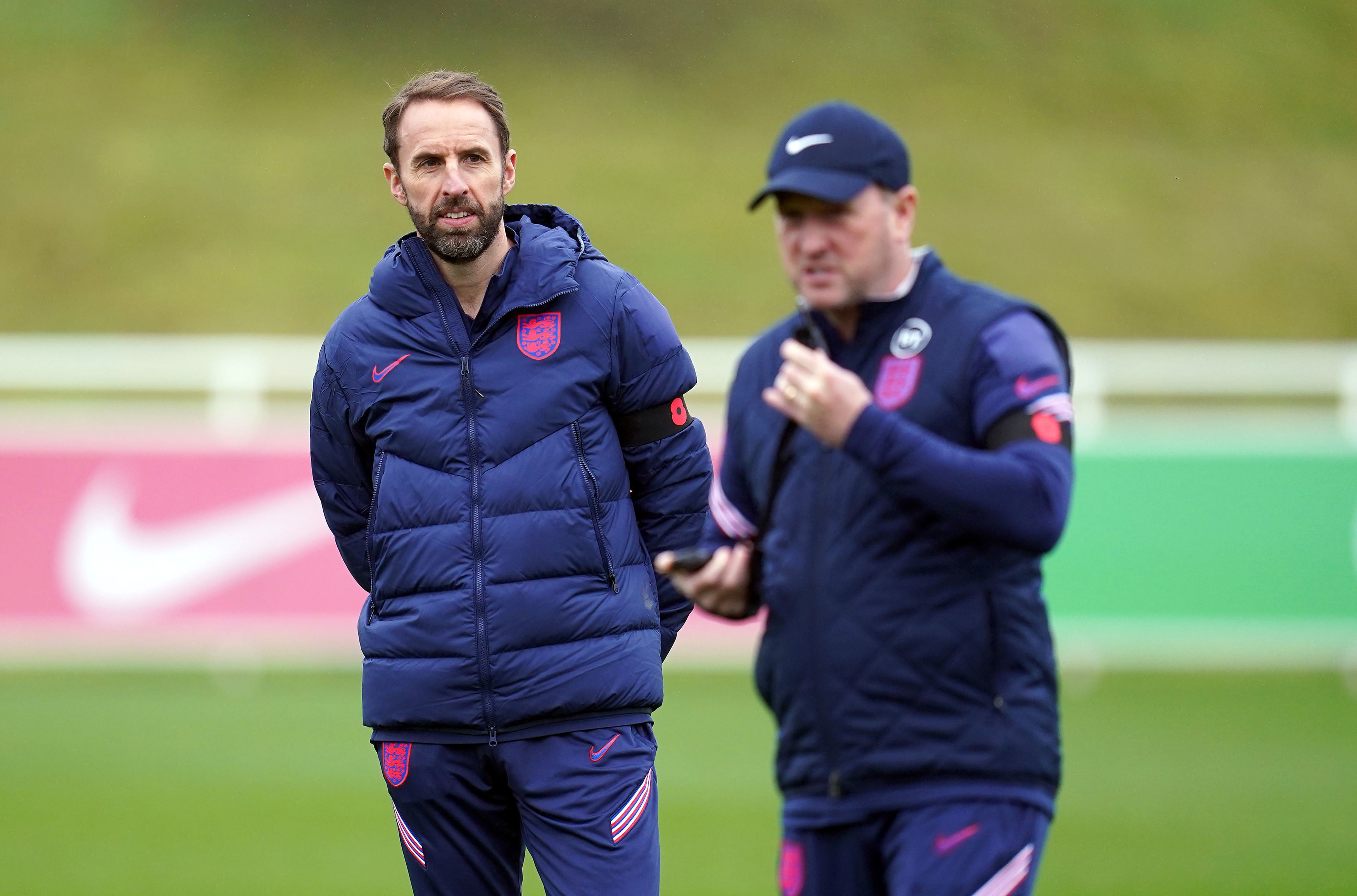How England and Gareth Southgate show Manchester United the value of having a plan
Southgate and Solskjaer were appointed to England and Manchester United in similar circumstances but only one fitted a broader strategy and suited the long-terms demands of the job

As the FA unveiled Gareth Southgate’s shiny new England contract on Monday, a thought drifted to Manchester United’s sacking of Ole Gunnar Solskjaer 24 hours earlier and the parallels between them. Both were former players for their team, hired on an interim basis to steady the ship after the turbulence of what came before; both won their first few games, earned the support of players and fans and forced the hierarchy’s hand. They had a similar body of work, too – Solskjaer completed two full seasons, Southgate two major tournaments – but their diverging fates can be traced right back to the start.
Southgate fitted England’s broader strategy. He was a stopgap after the Sam Allardyce scandal in 2016 but he was not plucked from thin air: Southgate had been managing England Under-21s creditably for three years and he understood the FA’s “England DNA” – a ringbinder of cringeworthy management speak created in 2014 which, in fairness, paved the way for closer links between the youth and senior teams and established a shared philosophy throughout the England setup, the fabric of which Southgate knew better than anyone.
Solskjaer was a temporary choice too, sent in to clean up after Jose Mourinho. On his appointment, United said he would “remain in place while the club conducts a thorough recruitment process for a new full-time manager”. There was no wider plan at United, who were blinded by his immediate impact, such is the galvanising effect of simply not being an egomaniac. In many ways Solskjaer was the perfect man for the interim job, the smiling face of change, but installing him as permanent manager effectively capped what United could achieve against great innovators like Jurgen Klopp and Pep Guardiola.
Southgate was no managerial genius either, but the FA recognised that his skills suited the long-term job. There is less opportunity to develop tactical blueprints in the international arena, a place where other talents come to the fore: Southgate applied his thoughtful football brain, his diligence, his empathy. He proved adept with the various demands of the job, from its politics to handling the media, from player discipline to confronting abuse and racism.
Crucially, they named a complementary right-hand man in the highly regarded coach Steve Holland, who often designed England’s coaching sessions and built detail into their gameplans. When asked on Monday what he had learnt most in his time as England manager so far, Southgate answered unequivocally: having the right people around him, people he trusts. He namechecked Holland several times.

Even if Southgate now failed, England would at least have an idea of what they want, the outline of a shape that needs filling. Do United have this? The many managers to have been linked with temporary and permanent jobs this week show the pace of the rumour mill but also reflect the genuine indecision in the club’s hierarchy. Sir Alex Ferguson reportedly wants Mauricio Pochettino, but what exactly is Ferguson’s role? Executive vice-chairman Ed Woodward is meant to be leaving, so why is he involved in appointing a manager he will not be working with? Meanwhile technical director Darren Fletcher has been reported to carry out training sessions, confusingly for players given he is not a coach, and Solskjaer’s control were not always obvious.
There is at least some clarity of thinking at the FA right now. You can see it in the details of Southgate’s contract, like the footnote that it runs until December 2024, several months after the conclusion of the next Euros. The unusual end date was devised by technical director John McDermott to give both Southgate and the FA a period of reflection after the tournament, a chance to think outside the emotional cylinder of a major finals; the contract still contains a break clause immediately after the Euros should either party feel certain it is the end of the road. It is a glimpse into the kind of forethought that is hard to discern from Old Trafford these days.
It would be a stretch to paint the FA as some kind of model organisation, a governing body whose chairman resigned 12 months ago in embarrassing circumstances, and who, lest we forget, appointed Allardyce. But Southgate was more than a happy accident: he was the culmination of what had been building ever since the establishment of England’s base at St George’s Park in 2012, which helped to create something akin to a club atmosphere in the national team and sowed the seeds for some joined-up thinking.
Southgate still wants to get back into club management one day. “People view my club management purely through the eyes of a relegation [with Middlesbrough in 2009], so there is the obvious part of you that wants to prove people wrong,” he said on Monday. “There will be a day when I do that, I’m sure.” When the time comes, it will be about finding a role that suits him; Southgate has shown that management is not necessarily about being the best coach but about being the right person for the right job. Solskjaer was fleetingly that man for United, but they failed to grasp that the moment had passed.
Join our commenting forum
Join thought-provoking conversations, follow other Independent readers and see their replies
Comments
Bookmark popover
Removed from bookmarks